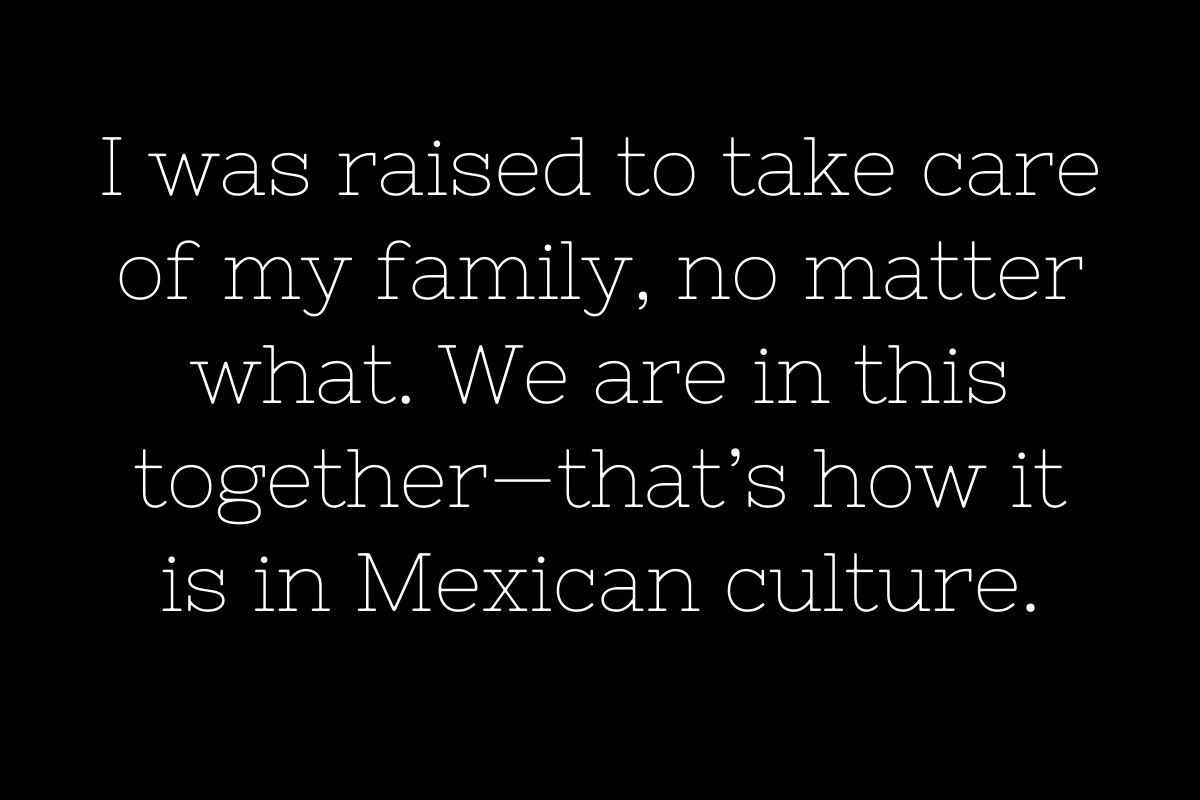

By Nicole Campbell
I was raised to take care of my family, no matter what. We are in this together—that’s how it is in Mexican culture. My grandparents helped my mother raise me, and when my 84-year-old grandmother’s health started declining a few years ago, there was no question that I would help take care of her. I need to represent who my mom raised me to be. As a nurse who often works more than 40 hours a week, I can’t care for her alone. Unfortunately, Rio Rico, the small Arizona community where we live, has few resources and even fewer in-home caregivers.
Many women in my generation are facing the same issue. The shortage of accessible in-home care means that we often have to choose between keeping our jobs and caring for our aging or ailing loved ones. Millions of women are leaving the workforce, and a disproportionate number have been Latinas.
This week and next, Congress has a historic opportunity to address this crisis by passing President Biden’s Build Back Better agenda. But they’re trimming the bill down, and today we learned that funding for home care is one of the most vulnerable components.
My grandmother has been partially paralyzed since she had three consecutive strokes 30 years ago. She is a fifth-generation rancher’s wife and for years lived independently in an apartment in nearby Nogales. But as she aged, other ailments began to limit her mobility. After a long process of trying to find resources, my family could only secure a home health aide to come bathe her twice a week. She couldn’t cook or wash herself, and she became a high fall risk. In my limited spare time, I visited to help her shower and prepare meals for the week. One day, I noticed she had bumps and bruises from falling, and I knew she needed more care.
I tried to access more in-home care services to go to her apartment, but agencies didn’t have enough staff, so she would have had to be on a waitlist. There are few resources for elderly people in border towns like Nogales. I couldn’t let her stay in an unsafe situation, so she moved in with my husband and me.
I work 40- to 56-hour weeks and can’t always be there for my grandmother. We still can only access a home health aide twice a week to bathe her due to the high demand and low supply of these resources. As her daily needs increase, I’m needed at home more. She now needs help to use the bathroom, and if she doesn’t get turned in bed, she will get several bed sores. Some days I have to step away to call and check on her or run home and ask coworkers to cover for me, which means I have to work overtime to make up for those lost hours.
Fortunately, my nephew and niece have helped care for her as well—but they’ll soon be needed at work and school. We can’t hire private caregivers, because my family is not independently wealthy. We pull together to do what we can, but the cost of caring for a half-paralyzed, 84-year-old “nanita” can be difficult without additional help. If I can’t find a home caregiver for her, I don’t know what I will do. Quitting my job is not an option—and she does not want to go into a nursing home.
It’s no wonder there aren’t enough long-term care options available: The industry is greatly underfunded and understaffed. Twenty-three years ago, when I was a certified nursing assistant (CNA), I made $13 an hour —a dollar more than a home health aide makes today. Caregivers are not fairly compensated, so many leave for better-paying jobs. As a result, families like mine can’t find care for their aging loved ones.
President Biden’s proposal for home care would invest billions into the home- and community-based care industry to raise caregivers’ wages, improve training, and increase the supply of caregivers. Given that 81% of Americans support the home care policies in the Build Back Better plan, our elected leaders should support them as well.
I feel grateful that I can return the care my grandmother gave me all those years ago. My mother has passed on, and I honor her by caring for her mother. But without additional help from in-home caregivers, I will struggle to ensure that my grandmother stays safe, healthy, and at home with me. As a taxpayer, I should not have to worry about finding the help that my grandmother deserves.
I’ve always believed that the government should be there to help when you fall on hard times. The people you vote for should stick up for you. Senators Mark Kelly and Kyrsten Sinema should have Arizona’s back.
I am lucky to have help from my family, but there are many people who aren’t as fortunate and worry about where their loved ones will go. As Congress considers the Build Back Better Act, they have a historic opportunity to help millions of working families across America before they reach the care crisis I’m facing now.
***
Nicole Campbell lives in Rio Rico with her husband, Todd, and her grandmother, Virginia.



so many people today access medicaid, there just isnt enough to go around. it will only get worse.